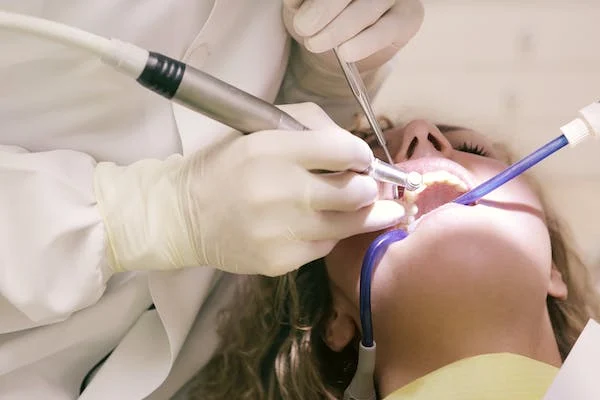Maintaining oral health involves more than just brushing and flossing at home; it may also require visits to the dental hygienist for deep cleanings. Regular and thorough deep cleaning for teeth are two different types of professional dental cleanings, and many patients have questions regarding the distinction between the two. In order to make educated choices regarding your oral health, it is helpful to understand these distinctions.
What Are The Main Differences Between A v Regular Dental Cleaning And A Deep Cleaning?
People who take excellent care of their teeth and gums should see a dentist regularly, usually every six months, for a cleaning (or prophylaxis). Tooth surfaces and the interdental region are the primary targets of this cleaning method.
The main goal is to remove plaque, tartar, and minor stains that have accumulated on the teeth. This process involves tooth scaling (removing plaque and tartar from the surface of the teeth), tooth polishing, and sometimes debridement if large amounts of tartar have accumulated.
In contrast, a deep cleaning, also known as scaling and root planing, is a more intensive procedure aimed at treating gum disease and preventing its progression. This type of cleaning is necessary when tartar buildup has spread below the gum line, leading to periodontal disease.
During a deep cleaning, the dentist or hygienist removes plaque and tartar from beneath the gums, and smoothes the roots of your teeth to help your gums reattach to your teeth, reducing the depth of gum pockets.
When Is A Deep Cleaning Recommended Instead Of A Regular Cleaning?
Deep cleaning, or scaling and root planing, or any operation where deep cleaning for teeth is a specialized dental procedure that goes beyond the scope of a regular cleaning. It becomes necessary when specific symptoms and clinical signs indicate the presence of periodontal (gum) disease. Here’s when a deep cleaning is typically recommended over a regular cleaning:
- Presence of Gum Disease Symptoms: Deep cleaning is advised when symptoms such as bleeding gums, persistent bad breath (halitosis), gum recession, and loose teeth are observed. These symptoms suggest the presence of an active infection and inflammation in the gums, which regular cleanings are not thorough enough to address.
- Measurement of Gum Pockets: During routine dental check-ups, dentists measure the depth of the space (pocket) between the teeth and gums. Healthy gums typically have pocket depths of 1 to 3 millimeters. When these pockets exceed 4 millimeters, it indicates that plaque and tartar have accumulated below the gum line, creating a breeding ground for bacteria that cannot be removed with standard cleaning tools. Deep cleaning involves scaling to remove this plaque and tartar, and root planing to smooth the tooth root and help the gums reattach.
- Prevention of Disease Progression: If left untreated, periodontal disease can lead to the deterioration of the supporting bone structure, eventual tooth loss, and may contribute to systemic health problems like heart disease and diabetes. A deep cleaning can halt the progression of periodontal disease, thereby preserving both dental and overall health.
- Regular Maintenance After Treatment: Once a patient has been treated for periodontal disease, deep cleanings may be recommended periodically as part of a maintenance program to prevent the recurrence of severe gum disease.
Deep cleaning is not just a preventive measure but a necessary treatment to manage existing periodontal disease, ensuring both oral and general health are maintained. It is tailored to the needs of individuals showing signs of significant gum disease and is critical for restoring the health of their gums and supporting structures of the teeth.
Does Insurance Typically Cover Both Regular Cleanings And Deep Cleanings?
Understanding how dental insurance covers cleanings, both regular and deep, is crucial for managing your dental care expenses effectively. Here’s a deeper look into how dental insurance typically handles these procedures:
- Regular Cleanings: Most dental insurance plans categorize regular dental cleanings, or prophylaxis, as preventive care. This classification generally means that the cost is fully covered, allowing patients to receive two cleanings per year without any out-of-pocket expense. These sessions are intended to maintain oral health and prevent diseases, which is why they are often fully covered by insurance providers.
- Deep Cleanings: The coverage for deep cleanings, also known as scaling and root planing, can be more complex. Although many dental insurance plans recognize the necessity of deep cleanings for patients with periodontal disease, the coverage can vary widely:
- Partial Coverage: It’s common for insurers to cover a significant portion of the cost of deep cleaning, but not all. Patients might find that their insurance covers 50-80% of the total cost, depending on their specific plan.
- Frequency and Necessity: Coverage often depends on the patient’s diagnosis and the perceived necessity of the procedure. Insurers typically require a diagnosis of periodontal disease and may limit the number of times deep cleaning can be covered within a certain period.
- Out-of-Pocket Costs: Due to the variable coverage, patients may face higher out-of-pocket costs for deep cleanings compared to regular cleanings. This is because deep cleanings are more extensive and involved, requiring more time and resources.
Given these variations in coverage, it’s important for patients to proactively check with their dental insurance provider to fully understand their benefits. Knowing what portion of the cost is covered, any limitations on frequency, and potential out-of-pocket expenses will help in planning and budgeting for necessary dental treatments.
It’s also advisable to discuss these details with your dental office, as they can offer assistance in understanding and utilizing your insurance benefits to their fullest extent. This proactive approach ensures that you can maintain your oral health without any unexpected financial burdens.
What Are The Potential Risks And Side Effects Of A Deep Cleaning?
While deep cleaning is a safe and effective way to address periodontal disease, there are some risks and side effects associated with the procedure. Patients may experience some discomfort during and after the treatment, including sensitivity to temperature changes and soreness in the gums. Minor bleeding during the procedure is also common, especially if you are undergoing a deep teeth cleaning.
However, these side effects are typically mild and temporary. Over-the-counter pain relievers and good oral hygiene can help manage any discomfort. It is crucial for patients to follow the aftercare instructions provided by their dentist to minimize risks and ensure a smooth healing process.
Understanding the differences between regular and deep cleaning is essential for maintaining optimal dental health. Regular cleanings are part of routine maintenance, while deep cleanings target the underlying issues associated with periodontal disease.
Both procedures play a vital role in a comprehensive dental care plan, and your dentist can guide you on which type of cleaning is best suited for your specific needs. Regular consultations and staying proactive about your oral health can prevent the progression of gum disease and the need for antibiotic treatment.
Why Choose Cascade Dental for Your Dental Cleaning Needs
Here at Cascade Dental, we take a holistic approach to dental health by integrating state-of-the-art equipment, skilled professionals, and a relaxing atmosphere. For both routine and extensive cleanings, our dedication to quality dental hygiene treatments makes us the best option for those who need a deep cleaning. Here’s why we stand out:
Tailored Dental Care: We understand that each patient’s dental needs are unique. Our experienced dental professionals assess your oral health with precision and provide customized cleaning plans that target specific issues, ensuring optimal care and prevention strategies.
Advanced Hygiene Technology: Utilizing the latest in dental technology, Cascade Dental offers highly effective treatments that minimize discomfort and maximize efficiency. Whether it’s removing plaque with ultrasonic scalers or using advanced diagnostics to assess gum health, we equip our team with the best tools to provide exceptional care.
Patient Comfort and Education: We believe in not just treating but also educating our patients. By informing you about your dental health and how to maintain it, we empower you to make the best decisions for your oral care. Our clinic is designed to make your visits as comfortable and anxiety-free as possible, enhancing your overall experience.
Frequently Asked Questions at Cascade Dental
How much does a regular dental cleaning cost at Cascade Dental?
Our regular cleaning sessions typically range from $100 to $200. These cleanings include plaque and tartar removal, polishing, and a comprehensive dental exam.
What is the cost of a deep cleaning at Cascade Dental?
Deep cleaning prices at Cascade Dental range from $200 to $400 per quadrant, depending on the severity of the periodontal disease. This cost includes scaling and root planing to effectively treat gum disease, which may be necessary if you need scaling.
Are dental cleanings covered by insurance at Cascade Dental?
Yes, most dental insurance plans cover at least part of the cost of both regular and deep cleanings, including treatments that may involve a hand-held dental scaler. For more information regarding your coverage, it is advisable to contact your provider about the dental deep cleaning options available. If you need assistance navigating your benefits or making sure you’re getting the most out of them, our staff is always happy to help.
What can I expect after a deep cleaning at Cascade Dental?
After a deep cleaning, some patients may experience slight discomfort or sensitivity, which typically subsides within a few days. In addition to providing thorough aftercare instructions, we are available 24/7 to answer any questions or address any concerns you may have.
Ready to Experience Top-Notch Dental Care?
Don’t wait to take control of your oral health. Cascade Dental is here to assist you with high-quality dental cleanings that are essential for maintaining healthy teeth and gums.
Book Your Next Dental Cleaning with Cascade Dental!
If you’re looking for professional dental cleaning that prioritizes your health and comfort, look no further than Cascade Dental. Call us today at (360) 892-2994 or visit our website at cascadedental.com to schedule your appointment. Our friendly team is ready to provide you with the personalized care you deserve. Take the first step towards a healthier, brighter smile with Cascade Dental!



